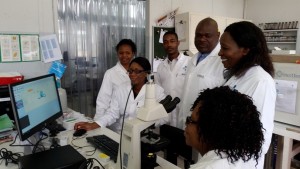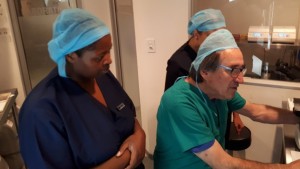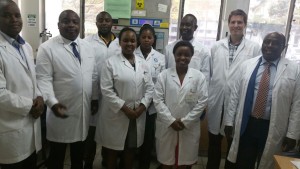Major new role players in the clinical setting using CASA technology for sperm quality assessment in Africa
In most of Southern Africa and in Scandinavia there has long been a history of resistance to the use of Computer Aided Sperm Analysis (CASA) in the clinical/IVF laboratory setting. This is partly understandable since several CASA systems were not reputable in the past particularly in measuring sperm concentration accurately and determining the percentage normal sperm morphology automatically and objectively. However, rapid development in bio-engineering and fast computing ability during the last decade made CASA systems more acceptable in evaluating human sperm quality objectively. Globally there is now a better appreciation of the value of CASA systems as being more consistent and more objective than manual assessment of human sperm quality.
During 2017 three new Sperm Class Analyzer – SCA 6.2 systems have been installed in Africa, South of the Sahara. One in Harare (Zimbabwe), one in Cape Town (South Africa) and one in Nairobi (Kenya).
I installed the first system at CIMAS, Harare. CIMAS employs 400 people across Zimbabwe and is a major role player in medical insurance, pathology laboratories and ambulance services. They have a devoted Andrology laboratory with about eight staff involved in semen analysis. Apart from installation of SCA 6.2 with several modules, a four day intensive training course was provided and included basics of microscopy to preparing semen samples for sperm concentration, sperm motility, sperm morphology and sperm vitality SCA automated modules. As the first CASA system in Harare, they will process more semen samples and pave the way in Zimbabwe for the more objective way of analysing sperm.
The second system was installed at Cape Fertility Clinic, Cape Town. While about 17 SCA CASA systems are operational in South Africa this is only one of three clinical facilities that will be using SCA 6.2. Five staff members were trained over four days at CFC and the system is also linked to Lancet, largest pathology role player in Africa and located in Pretoria. This system will be used in the typical IVF setting but will also be utilized for research purposes by two staff members (embryologists).
The third system was installed at Nairobi Hospital by the Microptic Technical Engineer, Gerardo Lijs:
We successfully installed Sperm Class Analyzer and trained the technicians in Nairobi Hospital in the use of the system. The reports were upgraded to provide more detail and they are now working much faster and accurate using a CASA system.
It is evident that clinical facilities in Africa involved in IVF will become more involved with using CASA to provide objective evaluation of sperm quality and provide more consistent analysis than with manual assessment. It is also acknowledged that these three facilities will eventually show the value of CASA in providing reliable, objective and consistent analysis. It is conceivable that these three facilities will set the pace with SCA CASA in sperm evaluation and subsequent IVF in Africa.
Prof Gerhard van der Horst (PhD, PhD)
Senior Consultant
MICROPTIC S.L.






I am really excited about the inroads that CASA is making in the Human Clinical setting and especially Africa. There is a definite need for more objective sperm analysis and global standardization.
Nice to read this! We thank all people (like you) who help us to continue moving forward.
Hi We have a CASA system in our lab and are going to implement it in our routine analyses. It is also an amazing system for research purposes, animals and humans.
And of course the after sale service from Microptic is awesome.
Nice words!! Thank you for your comment!